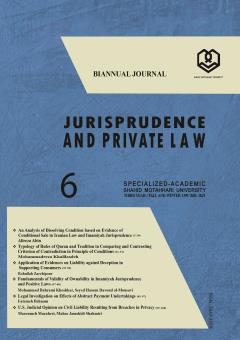-
-
-
Open Access Article
1 - Mortgage of Jointly Owned Property in the Jurisprudence of Five Religious Schools of Law and in Iranian Law
Saeed FarsadAbstract: Mortgage of jointly owned property (indivisum) is permissible according to Imamiyah, Maliki, Shafi’i, and Hanbali (except Hanafi) schools of Law because it is an instance of the rule of dominion. This is because conclusion of the mortgage contract does not mea MoreAbstract: Mortgage of jointly owned property (indivisum) is permissible according to Imamiyah, Maliki, Shafi’i, and Hanbali (except Hanafi) schools of Law because it is an instance of the rule of dominion. This is because conclusion of the mortgage contract does not mean possession of the jointly owned property. It is clear that submission of the jointly owned property to the mortgagee, in cases where it requires possession of the shares of the other partners, requires obtaining their consent. In cases where the mortgager submits the property to the mortgagee without the consent of the other partners, he shall be considered legally responsible for that. However, in cases where the submission of property means evacuation, the submission of the property does not mean possession of the shares of other partners, thus according to the jurisprudence of the above-said schools of law it does not need their consent for evacuation. This paper intends to study these issues in the jurisprudence of the abovementioned five schools of law and in the Iranian law. Manuscript profile -
Open Access Article
2 - Jurisprudential and Legal Investigation of Digital Data Value and Ownership in Cyberspace
Seyed Alireza Foroughi Asma Hosseinzadeh SereshkiAbstract: In this study, we have classified digital data into three groups to precisely investigate digital data value and ownership: (1) Digital data with foreign likeness. Cyberspace is an environment for intellectual property such as computer software that are availa MoreAbstract: In this study, we have classified digital data into three groups to precisely investigate digital data value and ownership: (1) Digital data with foreign likeness. Cyberspace is an environment for intellectual property such as computer software that are available as digital data. (2) Big data that is naturally realizable outside the network but is available in cyberspace since it is large in volume and time-consuming for external handling. (3) Data such as domain and web hosting that are instruments for cyberspace and there is no foreign likeness for them and they have been created according to the requirements of the cyberspace. The value of the digital data is determined by the data’s economic value on one hand, and on the other hand, by inference to the types of properties in Fiqh and Islamic law. Ownership, too, in the context of full claim on digital data is acceptable due to the advantage of possessing it. In this study, we have studied each category under a certain legal system with respect to the characteristics of each category and qualities of properties according to Fiqh and Islamic law: The first and second groups – as intellectual rights – are placed under the principle of intellectual property and its rules of ownership. Cyberspace instruments shall be considered as the infrastructures such as hardware and the resulting benefits as well as ownership of such data will be investigated under civil property system. Manuscript profile -
Open Access Article
3 - A Comparison of Mortgage Contract and Transaction with Right of Restitution through an Approach based on Existing Precedent
Gholamali SedghiAbstract: Transaction with right of restitution refers to any supplementary and commutative contract in which the assignor reserves the right for himself to reject consideration and restitute transferred property. In view of the law on registration of deeds and real est MoreAbstract: Transaction with right of restitution refers to any supplementary and commutative contract in which the assignor reserves the right for himself to reject consideration and restitute transferred property. In view of the law on registration of deeds and real estates, transaction with right of restitution is a combined contract of rendable property and mortgage. There are, however, differences between transaction with right of restitution and mortgage including this that the contract interests belongs to the transferee in the transaction with the right of restitution while corpus interests of the mortgaged property belong to the mortgagee. By virtue of Article 324 of the law on registration of deeds and real estates and the existing precedent, all the benefits belong to the purchaser and given religious rules and regulations, this stipulation is the same as the debt interest. However, if we ignore the right of the purchaser to collect interests, given the degree of inflation and devaluation of money, we have equally ignored commutative justice in his case. Therefore, belongingness of the interests to him seems to be possible via bartering and realization of relative balance. Manuscript profile
List of Articles مالکی
-
The rights to this website are owned by the Raimag Press Management System.
Copyright © 2017-2024


